The future Father Seraphim was born in Herkimer, NY when his father, now Mitred Archpriest Nikita Chemodakov, studied at Holy Trinity Seminary in Jordanville. Seraphim earned a Diploma in Applied Science (Microbiology) at the University of Western Sydney in Australia in 1998; a Bachelor of Theology degree from Holy Trinity Orthodox Seminary in 2002; and a Masters in Clinical Mental Health Counseling from Georgian Court University in 2017. Currently, he is pursuing a Ph.D. in Marriage and Family Therapy at Eastern University.
Fr. Seraphim combines over 15 years of pastoral work with experience in the mental health field. Currently, he works as a family therapist in a substance abuse and addictions facility, as well as counseling in a private outpatient clinic, and serves as assistant priest at St. Vladimir’s Memorial Church in Jackson, NJ.
Father Seraphim, thank you very much for your time to reflect on important questions. The first question that I have for you is this: we have the tradition of the Holy Fathers, their teachings, – patrology in other words. And then we have also a tradition in how we apply their teachings in pastoral praxis. How would psychology relate to this? Why would we need psychology when we have this tradition? Is there a conflict between psychology and the teachings of the Holy Fathers?
Very interesting questions and there’s a lot of content there. Let’s start off with the last part of that question. So, do the teachings of the Holy Fathers conflict with psychology or psychological teaching as we know it in a worldly sense? It depends who you ask, first of all. Having said that, psychology is a big general umbrella term for many different, various specialty groups and professions. So just quickly going over it: psychiatrists are medical doctors who are at the top of the ladder. They’ve been given comprehensive psychological training, along with medical training but these days, they tend to not only practice and counsel people but also write out scripts for medications.
Then you have psychologists themselves; psychologists are broken up into various groups also. Those who are strictly psychological counselors, others who work for various organizations in the industry. For example, figuring out what would be a better way for a company to organize their structure for their employees and all that. And then going on to what I do, the psychotherapeutic field – those people who go into mental health counseling and also social workers who work in a clinical setting, counseling people.
Basically, the way I see it, those are the three groups. Some might argue there are more, that’s open for discussion later. So, having said that, I don’t think patristic teaching from my perspective conflicts with psychology. At the moment, I’m enrolled in a doctoral program in a Christian university; it’s not Orthodox, not Catholic, but a lot of emphasis is put onto weaving together theology with psychology. Even though for the Protestants, the Baptists, the Holy Fathers are more learned people and they don’t have that weight or importance that we Orthodox people associate with them; academics in that School do tend to interweave that.
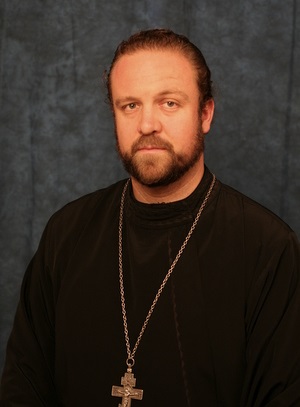 So, my practice now is to find parts of Scripture, Old Testament or New Testament, to weave them into my psychological and into my psychotherapeutic practice. I tend to do that or have started to do that quite often in the last eight months. A year ago, I was accepted as a family counselor in a rehabilitation center, a substance abuse center, for those people who are suffering from addictions to alcohol and drugs. And I have to say that I hear some of the most heartfelt confessions in my sessions with these people and their families than maybe at church These people have probably reached rock bottom or the bottom of the ladder; they don’t know what to do. And so, I feel and I see that they’re more open talking about religion and God. And when they open it up, I don’t advertise that I’m a priest in my job. A lot of people do know that – my colleagues and all that -but to the clients, I don’t say a word. And when they start to talk about God, I throw out a few things there, if they’re willing to go along with that, with Scripture or whatever spiritual theme or topic that they’re touching upon and I find that the conversation goes so much farther. And then trying to make sense of it all in the context of their recovery efforts to stay sober, to get sober.
So, my practice now is to find parts of Scripture, Old Testament or New Testament, to weave them into my psychological and into my psychotherapeutic practice. I tend to do that or have started to do that quite often in the last eight months. A year ago, I was accepted as a family counselor in a rehabilitation center, a substance abuse center, for those people who are suffering from addictions to alcohol and drugs. And I have to say that I hear some of the most heartfelt confessions in my sessions with these people and their families than maybe at church These people have probably reached rock bottom or the bottom of the ladder; they don’t know what to do. And so, I feel and I see that they’re more open talking about religion and God. And when they open it up, I don’t advertise that I’m a priest in my job. A lot of people do know that – my colleagues and all that -but to the clients, I don’t say a word. And when they start to talk about God, I throw out a few things there, if they’re willing to go along with that, with Scripture or whatever spiritual theme or topic that they’re touching upon and I find that the conversation goes so much farther. And then trying to make sense of it all in the context of their recovery efforts to stay sober, to get sober.
I’m talking about Scripture here; as far as patrology, and the teachings of the Holy Fathers, I’m still getting acquainted (or re-acquainted I should say) and trying to make sense of their teachings in my practice. My bottom answer would be ‘no’, there’s no conflict. Although, having said that, I think the psychotherapeutic field, the psychological field, sometimes can be so ambivalent, so wide a spectrum, whereas sometimes the Holy Fathers can come across as very straight and narrow.
I knew and felt that the people wanted more and this is where my search for something bigger started. And all I knew back then that there was the word psychology and I didn’t know what I explained earlier in this interview.
Why would a clergyman or a prospective clergyman, need some basic knowledge of psychology?
I think it’s essential for clergymen to know about psychology, especially now in the 21st century because we hear about it all the time. We hear about counselors – ‘you should seek a counselor’. We refer couples to marriage counselors; we know that there are substance abuse counselors. But something that I’ll admit, actually, is not having had those courses in my time at the seminary. Had I had that, I may have been ahead of the game, so to speak, but I found out the hard way. Through trial and error, I got to a certain point in my pastoral service or serving the Church where I could no longer justify saying, “Well, let’s pray about it.” or “Let’s serve a moleben.” I knew and felt that the people wanted more and this is where my search for something bigger started. And all I knew back then that there was the word psychology and I didn’t know what I explained earlier in this interview.
And when I got into it, I found out that it’s multifaceted; everything from the ethical side through to attachment theory. The ability to be able to talk to people, not to impose your own ideals but have them bring up what they’re trying to get across to you. I find that sometimes clergyman can be very (I don’t want to be judgmental) but sometimes I feel and I’ve seen that they come across very rigidly to people and have pushed people away without being more sensitive to their feelings. Maybe emotions, maybe somebody’s family member has passed away, and just pushing something onto a non-religious person, something that’s very religious and it just doesn’t come across – it’s like using a different language.
Coming back to the question, is it important for prospective clergymen or clergymen even now to know psychology? I think the elementary facets of psychology – yes. I remember going into this; a lot of people questioned why I was seeking this field. Freud, he talks about psychosexual fantasies and all this is what I’ve heard from some priests. Actually, Freud is like the least of our worries. A lot of people don’t even pay much attention to his school anymore. He gave rise and a certain foundation to the field of psychology. But psychologists have evolved so much more since his time.
Freud, he talks about psychosexual fantasies and all this is what I’ve heard from some priests. Actually, Freud is like the least of our worries.
Something that’s very important to me now, and I’m reading a few fascinating textbooks, is attachment theory. How a mother figure, be it a caregiver or a mother, brings up her child and that attachment that they have with each other. If I can just go a little bit off course here: there’s insecure and secure attachments. And, however, the child perceives that attachment to be, whether securely or not, is what he then brings on over into his adult life.
This then may manifest itself, if it’s insecure, in him seeking a secure attachment with somebody else. And in some instances, now that I am seeing it in my work at a substance abuse facility, these attachment figures become alcohol and drugs. But also, I’ve got some very enlightened -I shouldn’t say enlightened – but some very well-meaning Christian professors who have pointed out that we can also use God, the Church, the Mysteries and the scenes as attachment figures, which not many people think about.
So that’s one little field of, one field out of, a wide spectrum of psychology that I pay attention to. And I try and instill or bring up in my conversations with people, getting them to see that. And then perhaps, through that, maybe their sinfulness and the need to purify the soul. And to seek out the mysteries of the sacraments rather, of confession, of Communion. So, is it essential for clergymen to know psychology? I wouldn’t say essential, but it really does help and makes a clergyman a little bit more well-rounded.
Thank you, Father Seraphim. Right to the point. I thank you for your response. Can we speak about the typological profile of church people? I mean of course, I mean people of my persuasion: Russian Orthodox, members of my Church. Can we speak about a sort of common profile of people who are heavily involved in Church?, I’m guessing there are specific problems of people who, involved with the Church. For example, if you are insecure, an ascetic system of interaction revolving around blessing may lead such a lay person into a paralysis of will, delegating decision making to his or her confessing father. It is good if a father confessor recognizes the situation and says, “Listen, this is your life to live. I can sit with you and look at this, but the decision remains with you.”
Right, I see myself talking for a long time on this particular question, so let me narrow it down. First of all, I recall, and I forget whose words they are, but they say that the Church is the hospital. And I remember reading a few papers written by Orthodox theologians/psychotherapists that even back in the days of Basil the Great, he was actually attributed to having set up what we know to be social medicine or certain facilities to care for the elderly and the sick and that carried over. I also recall a paper I read where the contrast between doctors in white lab coats and clergymen in black robes, somebody made sense of it – that both were out to look after a person. But from their specific angles, they too can be merged together. So having said that, the Church in general, the structure of the Church is a place where we seek consolation, where we seek to get better, to connect with God. I was talking with somebody recently in the church where I serve now. I am given the task of helping out the main priest there, to confess people during Vigil and, if it comes time to it, during Liturgy also. And from my perspective, recently I looked out into the crowd, just waiting for the next confessant to come up to where I was confessing. And it struck me that, of the people that I saw in church, they came from all walks of life, young and old. Maybe from the least educated to somebody who had a PhD, but they were all there together on the same level, expressing or asking God of whatever it is that they came to be there for. So, it’s most impressive: it was very enlightening and so pleasant to see that. All these people come from their different walks of life, from their jobs and schools and whatever. They put on hold for that particular period of time, to be in church as equals. And so, having said that, when I look at our congregants, I know that most are well-meaning, most people have their problems and afflictions in life. be it marital, maybe grieving the death of a close one. I see mothers and fathers grieving for their children who have gone off the track from the Church, maybe have turned to alcohol and drugs. I see those parents of toddlers and younger children, maybe prematurely be worried for the welfare of their growing children. I also as a psychotherapist can sometimes see that certain people are afflicted with much more than what our Church, as an organization, may be able to give them. Yes, we can get a lot and everything from the Church as I mentioned earlier: Communion and confession and other sacraments.
But I also see the benefit of such people may be seeking counseling, a therapist; some people need medications in order to lead a better quality of life which may then enable them to come to church and glorify God in the fullest. They are some of the perspectives and some of my insights that I tend to see when working with Church people.
On the other hand, working in the world, in a non-spiritual, non-churchly facility, I’m also seeing the other spectrum where a lot of people walk around and do everything but mention God or go to church or admit that there is a Creator who rules over us. A lot of people live life for the sake of living life. ‘I work to live’, I think is an expression people often use. So, I go to work, I make my money, and then get to Friday night and party until Sunday night. That’s something else I also hear: they live for their vacations, for their pets, for the fashion of the time but nothing is said about God.
To work in a psychotherapeutic field, just think about it: psychology is the study of the soul; psychotherapy is the healing of the soul. And if we don’t have God or spirituality with that, it seems so off-kilter, off-balance.
And what sometimes strikes me is when there’s a lack of spirituality in my field. How then it can become a little bit narrow-minded or sort of one-sided? To work in a psychotherapeutic field, just think about it: psychology is the study of the soul; psychotherapy is the healing of the soul. And if we don’t have God or spirituality with that, it seems so off-kilter, off-balance.
So that’s what I see from my perspective, the worldly side not having God or spirituality in it. And then the spiritual side, the Church side of things, sometimes in need of something else other than participation in liturgical life. It could be complemented with something that could make them fuller and more open to not just enjoying life but also the spiritual aspects of life.
Thank you, Father Seraphim. I think it’s quite common that we observe that children who grew up in Church, who were regular communicants, once they can, they may choose or they may not choose to continue to be in the Church. So that’s another specific problem for Church-people. What I’m kind of saying is that we as Church people have our questions and we need answers for them. And that’s my question for you: why do you think it happens often? And I’m not mentioning that it also a common problem for clergy, for ‘PKs’, for priest kids who were very, very intense with the Church in their young years. So, can you comment on this if possible?
It’s something I’ve seen over the years, even before I came to a seminary, living in Australia. Having reached a certain age where everybody went to church, the kids, the teenagers and all of a sudden something happened. And some of us remained with the Church and others just started to drift away and to this day I don’t know what happened to some of them. Maybe some of them returned to Church because they started up their own families, having gotten married and having been graced with children. But here in America, from the pastoral level, it is an unfortunate thing. And it’s something that I still sort of break my head over, trying to come up with an answer. Why does that happen?
And something that recently came to mind: as I’ve stated, I have continued in my studies and I think it’s a Baptist Protestant school. But a lot of them, perhaps as non-Orthodox Christians, don’t have the beauty of our services, that fullness of patrology and the liturgical cycle, and no mentioning lives of the saints and Lenten periods. And then these peaks ending with high holidays or our great feast days. But even though they don’t have all that, they are very much involved in Bible studies and going to the church on a Sunday morning. And a lot of them know the Scripture like the back of their hand and are involved in Church and yet they don’t have what we Orthodox have. And it made me think: what is it that maybe we’re not doing right or we’re doing wrong. And I think perhaps our people aren’t invested or aren’t participating in the service fully the way they could. Just standing in the church and listening to the singing and the deacon and the priest chanting is something but are they getting anything out of it?
I think those people who stand in church with a service book, maybe those who bring along the Gospel or the epistle and then follow, or if their parish provides that, that gives them something more into it. Does the sermon affect who is retained in Church or not? I’ve heard some very cut-and-dry sermons, I’ve heard very lively sermons, I’ve heard sermons that skirt the issue of the day and I’ve heard sermons which nip it right in the middle, hitting the nail on the head, certain issues of the day; if not all of the ambo, then in discussion groups, over a coffee hour, over lunch or study groups during the week.
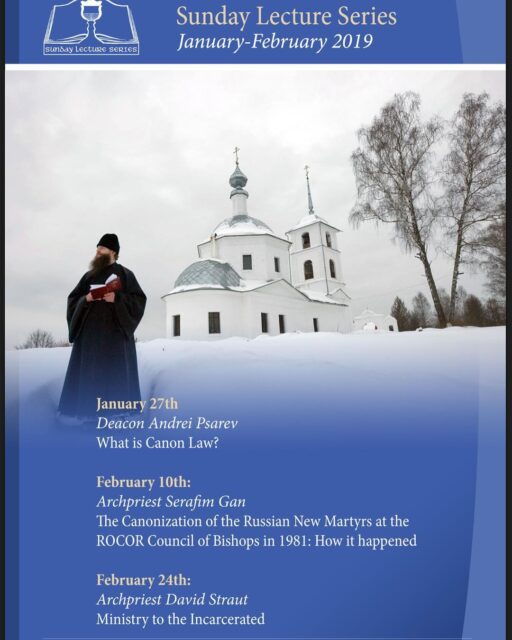
Fr. Seraphim has been organizing public events on various aspects of church life
So, answering your question, it’s a tough one. Why do people drift away? I think maybe because they’re not invested; maybe because their parish isn’t trying to provide something for them. It’s good when the larger parishes have enough, if we’re talking about children and the younger people if there’s enough of them to form a group; it’s that feeling of camaraderie: the peers are doing it, therefore I’ll do it. And if they see that I’m doing it, then they sort of start to raise the bar, the level and they get involved.
And if the priest can be bothered and has the energy to do Bible classes or Sunday school afterward, I think that takes them so much further. Giving that to them, not just coming to church, do the service, and then “see you next week.” When these kids are able to be engaged by their instructors, be it, priests or parishioners, I think that takes them so much farther. If the priest is ready to invest his precious time into giving the older parishioners, something – a spiritual talk of benefit, be it the lives of the saints or perhaps answering some questions, liturgical or questions regarding Lent. I think that also retains people. So from my perspective, you have to invest your time and energy in giving them the fullness that the Orthodox Church offers us outside of just the liturgy, the Sunday liturgy.
Basically, that’s what is called liturgy after liturgy.
If I can just add to that, I think also, not just keeping it strictly on the spiritual level. Some parishes are able to set up interesting outings for the children, a hike, canoeing down a river, maybe an ice cream social. I know a local parish recently hosted a movie night for their kids. So sometime after Christmas everybody got together and just watched a movie to everybody’s liking. They were served pizza and popcorn and a feeling that you are among like-minded people of the same faith. So, it’s not just we have to pray, which can get to some kids. Or do we have to go and get it? But when they have other things to look forward to, I think it provides for a more well-rounded approach and retainment of those people within the Church.
Right and I think the modern generation, they don’t take things for granted just because we happen to be born into this particular culture, this particular ethnicity. They want sensible answers, they want to rationalize, they want to ask: what do I get? They really want to get to the bottom of everything and I think that’s the reality. I don’t think we should ignore it; I think we should be up to this challenge.
Thank you, Father [Seraphim], it was very beautiful, very nourishing. I look forward to continuing our conversation.


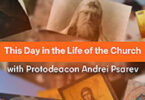



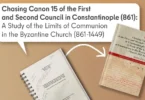

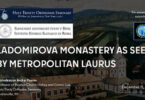
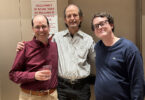


Thank you, Fr. Andrei, for interviewing Fr. Seraphim and for the excellent questions you asked him. Everything he said about the compatibility of psychotherapy with Orthodoxy could have been said by my sister, who went to the Lord last year but spent many years as a psychotherapist doing marriage and family counseling while being an active participant in the life of her parish. And now her daughter is doing the same, having recently retired as a psychology professor.
Thank you, fr. Andrei for letting us listen and read this interview with fr. Seraphim. It was very interesting. Being so far away from our son and not bring able to talk to him every day/ week, I now understand more of his work with people and the help he is able to offer and give.
Бог в помощь!
Very much needed field. Hope you inspire other good pastors to follow in your footsteps. By introducing such classes in Orthodox seminaries, this may help keep many younger, educated people from drifting away from our Church.
What an excellent discussion! Thank you for posting this. My serious inquiry into Holy Orthodoxy began by learning about the Icon of The Inexhaustible Cup through ROCOR’s Fellowship of The Inexhaustible Cup based in Virginia (USA). The director of the FIC discusses many of the same things ( through podcasts) that Fr. Seraphim discussed here.
If I may have the temerity to comment. To introduce myself; I am a medical doctor, retired from a busy practice in radiation oncology and palliative medicine in a small Australian city. I came to ROCOR almost twenty years ago, my initiation being into a university western rite parish. Subsequently, I attended Greek services for about nine years, and then returned to ROCOR when our small parish finally had a priest (who is also a social worker, by the way).
I write to comment on the loss of young folk from our churches. I think this is partly cultural and ethnic, especially where liturgy is served only in Slavonic. But for me, coming from western rite where our small congregation was the choir and did the responses, I think that part of the problem is that we just stand and listen to the service when we are clearly meant to participate! The service is beautiful but becomes more so when we join in singing responses and psalms etc.
Just a thought from a layman in a distant land.
As an Orthodox Christian and psychotherapist I wonder how the church is dealing with the rampant antisemitism since Oct 7 that stems from so many faithful believing in those fraudulent Protocols of the Elders of Zion? I’ve seen it cause such a huge amount of toxicity both on an interpersonal and societal level.
This is the latest statement on the matter from the ROCOR Synod:
https://www.rocorstudies.org/2017/04/03/on-involvement-in-politics/
If you study this website you will see that I’ve confronted conspirological mindset in a number of publications.